[ad_1]
This local SEO checklist outlines 14 things you should take into account when it comes to optimising a website to target local areas:
On-Page SEO
Technical SEO
Link building
Reviews
What is local SEO?
Local SEO is the practice of optimising a website in order to increase traffic, leads and brand awareness from local search.
Why is local SEO this important?
There are many reasons why local SEO is important, such as:
- 46% of searches have a local intent
- “near me” have grown 150%, faster than comparable searches that do not include “near me”
- 29% of all Google SERPs contain a local pack in the results
- 76% of people who conduct a local search on their smartphone visit a business within 24 hours and 28% of those searches result in a purchase
These statistics make it very clear how important local SEO is. If you can get in front of these searches, there’s a pretty good chance they may get in touch not long after. So let’s get into how we can do that.
On-page local SEO
It’s important to get your on-page SEO right, especially it’s from a local SEO perspective.
1. Title tags
When it comes to title tags, it really boils down to three points:
- Be relevant (for humans and search engines)
- Be interesting (for humans)
- Be simple (for search engines)
While the idea of title tags sounds very simple, there is a thin line between search engine friendly and eye-catching for humans. Here are some of the best practices I use for general SEO as well as some points specific to local SEO:
- Unique title tags – keep them unique! Having the same name for multiple different pages can be extremely confusing for both humans and search engines which could lead to the black-listing of your pages
- Keyword optimisation – helps to improve the chance of your website being ranked and helps with relevance for searchers
- Location-specific – make it a habit to include your location in your title tags, especially if you serve locally
- Special offers or benefits – entice searchers in; what makes you unique compared to your competitors? Are there any discounts they could take advantage of?
- Title length – Google often truncates title tags that are longer than 65 characters, so keep this in mind when deciding what the most important thing searchers should see. However, you could use this to your advantage…
Title tag cliffhangers
There is a technique that companies use in paid advertising to draw customers in using a cliffhanger style title. This in theory may also work for local businesses.
The idea is that you begin your title with a strong statement but ensure your title tag goes beyond Google’s limit which is around 50-65 characters / 600 pixels to ensure that in search results it cuts off your title and replaces it with a …, therefore creating the interest to click the site to see more information.

2. Optimise images
It’s important to optimise images. Alt tags on images, for example, essentially convey a message to crawlers to help with indexing, so it is worth taking a small while to take an in-depth look at the way you are perceiving these images through your messaging.
Try including location keywords in the name of the image to help people understand what the image is and gain a higher chance of your image ranking on search.
3. Local landing pages
When it comes to local SEO, location pages are essential. Think of these pages as an advertisement for your brand in that location – what do you want people to know?
If you are a multi-location business, make a landing page for each of these locations with a hyper-focus on the semantics of that region.
In order to build a completely optimised location page, consider these points:
- Feature the name, address and phone number on the page as it is across the web
- Add your business hours
- Do you have any reviews for that location?
- Add links to any specific business profiles such as Google My Business and Bing
- When writing the content, focus on location-specific keywords
- Embedding Google Maps to help customers find your location is incredibly useful
- Do you have location-specific imagery? Help make your business recognisable in the area and add these in
- Has the specific location been added to any local publications?
4. Voice
In 2020, more than half of all smartphone users engaged with voice technology on their devices.
That is a huge amount considering per day, there are around 3.5 billion searches on Google alone.
The difference between voice searches and written searches is that voice searches tend to use natural language and be longer.
For example, take a keyword such as “steakhouse Nottingham”. If that same search was done using voice search it may sound more like “steakhouse in Nottingham that’s open right now”.
As this is a new concept, there isn’t really any tools or tips on how to find voice search keywords, but it is worth keeping this in mind.
Technical SEO
5. Structured data
Search engines crawl through your site on a regular basis, so it really appreciates it if you point out the important parts of your website to make the crawler’s life easier. That is essentially what structured data does.
Another plus is that often it puts the information you have made stand out on the page in search results too!
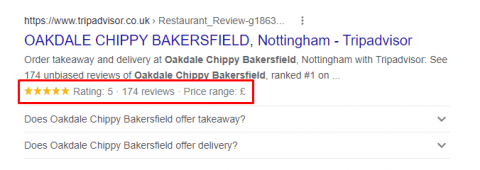
When it comes to local SEO, the parts of a page that we are most interested in Google knowing are:
- Business location
- Number of reviews your company has
- What kind of business you are
Thankfully there are free resources around that create the schema markup for you, all you have to do is input the data.
6. Page speed
Since 2018, Google has recognised page speed as a ranking factor. Not only this but it is essential for user experience. Keep this is mind when it comes to website design, creation and amends.
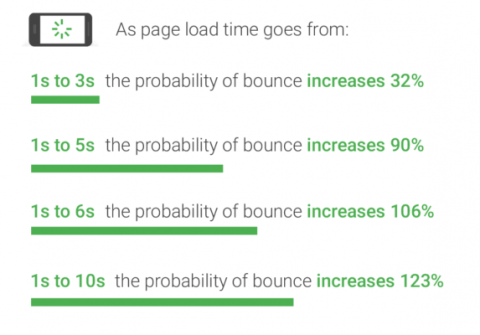
A few ways to improve page speed include:
- Compress and optimise your images
- Reduce the number of redirects
- Minify CSS, JavaScript, and HTML
- Deactivate any website plugins you’re not using
- Use a Content Delivery Network (CDN)
You can also use Google PageSpeed Insights to see if there are any opportunities you can implement.
7. Mobile-first
Did you know that 61% of mobile searchers are more likely to contact a local business if they have a mobile-friendly site?
Common ways people will use your site is through the mobile version, looking up reviews and contact information. To add to this, Google has a “mobile-first” initiative, where they use the mobile version of the website for indexing and ranking.
8. Google My Business
Here is a link containing all of Google’s guidelines regarding Google My Business: https://support.google.com/business/answer/3038177
Consistency
Consistency is the most important part of Google My Business. Your listings should not only match your website but all of your ‘name, address and phone number’ (NAP) local citations across the web. Google needs to see that your business information matches your website and other third-party websites such as Yelp.
But if your business is inconsistent, e.g addresses differ across the web, this can be seen as a red flag to Google. When a business changes its name, address or phone number, it is important to get everything changed as soon as possible. This includes all citations, Google listings, websites etc.
One final point on consistency is that Google can be VERY picky when it comes to the nitty-gritty details. For example, they heavily dislike it if one address says road and another says rd., another example being avenue and ave.
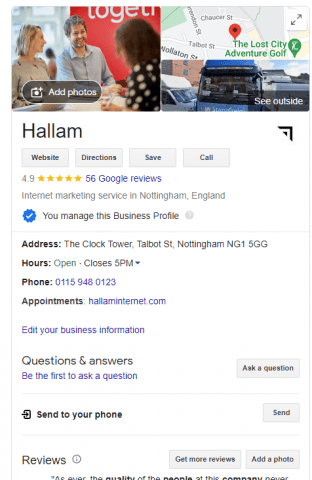
Fill in everything you can
Within the Google My Business profile, Google will give you a score for how complete your profile is. Although this is only a baseline score, it is always recommended that you go beyond this and fill out everything you possibly can.
Some common opportunities people miss are:
- Secondary business categories
- Services, menus and products
- Business attributes (if this is applicable)
Keep your listing up to date
It is good practice to check around once a quarter to ensure that your opening hours, any holidays, and other basic business information is accurate and up to date on your listings.
This doesn’t necessarily impact rankings but is a brilliant way of keeping your customers up to date and avoid any potential bad reviews to do with opening times being wrong or they drove to the address on the listing and you are not there.
Link building for local SEO
9. Local link building
When it comes to local link building, the majority of the usual link building strategies will work in this case but because local businesses have strong associations with a place or city, there are a lot of opportunities to build links within your local area.
Local businesses
It is very common for local businesses to have a connection with other businesses in the area.
The best place to start when link building locally is to simply start out by contacting people you already have a relationship with.
So this could be:
- Suppliers
- Contractors
- Neighbouring business
- Distributors
When reaching out to them, it is best to make it as straightforward as possible, so tell them exactly which page on their website, a link to you would make sense.
Sponsor local events
A lot of local events need sponsors. Often when you sponsor an event you can usually expect a link on the event’s website.
For example:
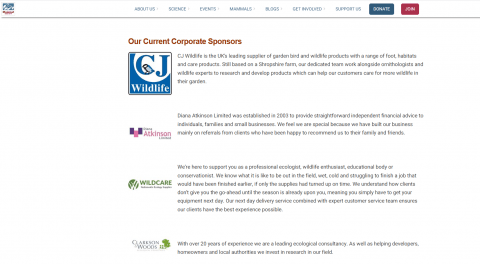
Your sponsorship doesn’t always need to be money, sometimes places appreciate any help you can give, for example, if you are a printing company, you could offer to print flyers.
Local PR
Local papers and news sites are always looking for interesting stories. If you do anything interesting such as an event or grand opening, you are more than likely able to get it covered in the news.
Local PR does require some planning though, making reporters aware a few days before the event, helping to write the story etc.
10. Social media
Social media for companies is something that is expected nowadays, but I won’t go into why it is essential but rather why you should spend some time building your brand using social media platforms:
- Reach new people – through organic or paid social adverts you could reach potential customers that you may not have been able to before. Establishing authority on a subject encourages trust in the brand, let people see why you are good at what you do
- Reconnect with old customers – they may not necessarily re-use your services straight away but giving them informative content and staying on their feeds may mean that when the time comes, they would think of you to use again
- Build your brand – with the way the internet has affected our browsing interests, the world is our oyster when it comes to purchasing, building your brand and gaining an emotional connection to your customers is more important than ever
- Local SEO benefits – every social media platform you create is a wonderful high-value link back to your website, but as stated above, is also a great way to be a gateway to new customers
- Traffic from social media = potential customers – Do I need to say more?
11. Competitors
If a business is offering the same service or product to you, they are most likely targeting the same audience. Keeping an eye on what your competitors are doing not only helps you to keep an advantage on them but could also allow you to spot potential opportunities for new avenues to utilise in your marketing strategy.
Customer reviews for local SEO
According to Moz’s local search ranking factors study, review signals play an important role when it comes to ranking factors.
It has been known that Google does not only look at Google My Business reviews but other 3rd party websites such as Yelp and Trust Pilot too.
12. Generating reviews
Generating Google reviews is often an overlooked part of a marketing strategy, but is arguably one of the easiest tasks you can complete.
In short, it can be as simple as:
- Asking for a review
- Adding a Google review button to your website
- Reviewing other businesses
13. Monitoring reviews
Whether they are good or bad, reviews go a long way when it comes to gaining a customer’s trust.
If a customer had a good experience, there is a possibility they will mention it to a couple of friends. A negative review on the other hand is more likely to bring in a larger crowd.
No business owner likes to see a negative review, but the way you acknowledge it will make all the difference – remember you know the context of the complaint. The best thing to do when it comes to a negative review is to take it offline and respond to the review with an option such as an email address or phone number to resolve it.
Some people may believe that positive reviews are a waste of time to respond to, what’s the point they are already happy right? But engaging with your customers in any way possible is only going to have a positive effect.
If you need more ammo, Google states specifically that negative reviews can hurt your business but replying to all reviews, even negative ones can help your local SEO efforts.
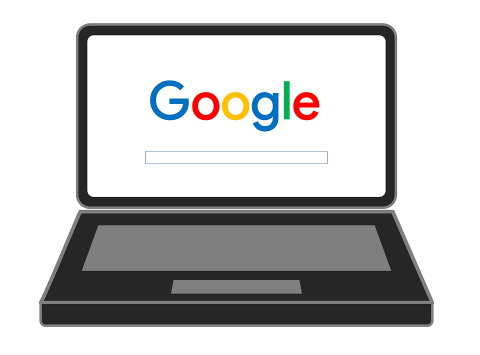
14. Testimonials
From a human perspective, local testimonials on your website are a great way to show a new user an example of the work you do and the quality of it. A way to think of it is, these customers are essentially brand ambassadors and could help you to encourage more potential customers to convert.
From a search engine perspective, adding reviews from your local customers can help to boost your local SEO efforts, they value the volume and quality of testimonials.
In Summary
There are many benefits of having a strong local SEO strategy. Increased visibility in local search results leads to increased brand awareness, and local SEO as a whole can be less costly and competitive than national or international SEO. By implementing the steps highlighted in this local SEO checklist, you will be on the road to local SEO success.
I hope you found this ultimate local SEO checklist useful. If you have any questions or need some further advice, please don’t hesitate to contact us or reach out to me directly on LinkedIn.
If you need help with your local SEO
don’t hesitate to contact us.
[ad_2]
Source link




More Stories
The Ultimate Work Desk Kit: From Eye Drops to Vicks Roll On
Essential Insights into Atlanta Insurance: Your Ultimate Guide
Transform Lives by Giving Plasma: A Comprehensive Guide